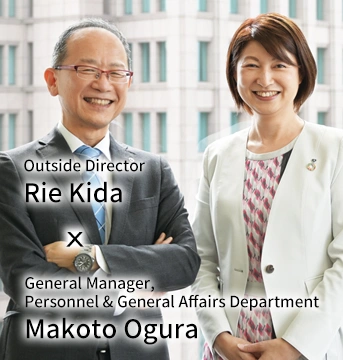From a historical perspective, Gunze is a company that treasures its inherited DNA. What are the attributes of Gunze’s human resources?
Ogura
Raw silk, a product of the founding silk reeling industry, is woven with warp and weft threads to form fabrics. Any slight imperfection in the quality of the weft thread can be offset through technical skills. Once the warp thread is set on the loom, adjustments to thread quality cannot be made later. For this reason, employing the highest quality thread from the outset is of the utmost importance. Gunze’s founding philosophy that embraces a people-oriented approach, a commitment to quality, and coexistence underpins the critical need to create new value by flexibly adapting the Company’s weft threads to the needs of the times while treasuring the warp threads of its DNA that are grounded in unchanging principles. As far as the manufacturing process is concerned, Gunze’s founder firmly believed that a pure heart produces a lustrous thread, an honest mind produces a thread of uniform fineness, and a peaceful heart produces a thread free of knots. Good people make good silk yarn, and trustworthy people make trustworthy products, We place considerable importance on the heart and soul of the manufacturer because we believe the ideal that Gunze has also defined the attitudes and stances that it values as the three important character traits: sincerity, affection, and modesty. Well-schooled in the philosophies of our founder, Gunze’s human resources maintain a firm commitment to quality. With this in mind, I believe that our employees are distinguished by their honesty and ardor.
What human resources challenge do you believe Gunze must address from your perspective as an outside director?
Kida
The attitudes of employees and the emphasis placed on improvement through steady accumulation are extremely impressive. In contrast, I am yet to meet many employees who are invigorated by unexpected and unique ideas, or passionate about their aspirations for the future. As we transition from a time when the future is considered as an extension of the past to an era where values are changing at an accelerated pace, and past experiences are no longer a pathway to success, Gunze is faced with the challenge of identifying human resources that can adapt. In a corporate culture where unique human resources are removed from a department on the premise that they are a bad fit, or the comments of employees are dismissed as erroneous and proposals rejected on the basis of perceived inefficiencies or a low probability of success in accordance with theories of historical examples of success, employees will inevitably refrain from making comments and avoid standing out. With this in mind, I believe Gunze should look beyond the status quo and place increased value on individuality and creativity. It is important for the Company to consciously foster a corporate climate that welcomes input from outside the box.
What specific measures do you think Gunze should take to address the current status of D&I and pending issues?
In particular, what steps should the Company take to achieve its target ratio of women in managerial roles of 20% or more by 2030?
Kida
Kida: If Gunze provides opportunities and tries to lift up those employees who work hard in accordance with conventional values and methods, it runs the risk of painting minority heterogenous employees with the same organizational brush. This is contrary to the inherent meaning of D&I, which places considerable importance on management that leverages diversity. I believe that top management and the Company as a whole must reaffirm its common understanding, namely the need to stimulate innovation in the organization’s management and marketing activities by promoting D&I.
To increase the number of women in managerial positions, Gunze must radically change its fundamental approach. The Company raised its ratio of women in managerial positions from 1.5% in the previous fiscal year, to 3% in the fiscal year under review. At this pace, and with a fiscal 2022 target of 4%, the Company will face considerable difficulty in achieving its target of 20% or higher by 2030.
Should this rate remain at its current pace, and the ratio come in at around 10% a decade from now, I wonder how Gunze will be viewed by a society in which women are far more active? Thinking seriously about the Company’s future, Gunze must be prepared to fundamentally review its approach toward human resources encompassing such wide-ranging issues as development, appointment, and evaluation.
Ogura
Currently, the ratio of women in managerial positions is 3% out of a roughly 350-strong management pool. By rightsizing the number of managers through DX and efforts to flatten the organization, I believe the ratio of women in managerial positions will be 20% or higher 10 years from now. As one initiative aimed at achieving this goal, we first took steps to create a role model for women to become managers while also raising children. Specifically, we introduced a system that allows employees to return to work after six months of childcare leave without interrupting their careers in March 2022. This system is based on the premise that a six-month leave of absence would allow other employees to make the necessary adjustments through mutual support thereby negating the need to fill the temporary absence. Staff members could then return without interrupting their careers. After returning to work, we have also institutionalized support to help defray the costs related to nursery school enrollment and other expenses.
Kida
Situations that require the unexpected and sudden leave are part and parcel of raising children. I suspect there are many employees raising young children who shy away from promotions to managerial positions for fear of inconveniencing those around them. It is therefore extremely important to create a system that allows people to ask for support when unexpected situations arise, and to create an environment and culture in which all employees are willing to help. Simply sending out the message that women should be encouraged to pursue managerial positions may create uncertainties and conflicts within the organization. Without the proactive support of the Company including efforts to foster the necessary climate and environment, women seeking to advance to managerial positions may balk at the idea and refrain from moving forward in their careers.
Ogura
Gunze’s policy is to hire an equal number of men and women for career-track positions in fiscal 2023. The Apparel Division has long had a high percentage of female employees, and women have been continuously placed in positions of responsibility and as managers of women’s products. The percentage of women in other divisions is low by comparison. It is therefore important that we continue to adopt a hiring policy that ensures retention across all divisions.
Kida
Depending on the department, some may argue that increasing the number of women will void existing management practices making it difficult to carry out work. I do not dispute that priority should be placed on efficiently completing tasks. I strongly believe, however, that management must deal resolutely with these concerns while maintaining a forward-looking perspective.
Ogura
I believe it is extremely important to motivate and raise the awareness of candidates for managerial promotion. Gunze will further enhance and implement education by level. The Company has a comprehensive development program for new recruits and employees up to their third to fourth year of employment. There is a gap between our training programs and the next level, which I believe is an issue that Gunze must address. As an initial step, we plan to prioritize level-based training for female employees identified as candidates for managerial positions. Thereafter, we intend to fully embed this development program across the Company as a whole, irrespective of gender.
Kida
Training is of course important. I would add that it is also important to take a more in-depth and detailed approach by business division.Arguably,there are fewer women, who are interested in managerial positions than men.
I suspect this is not only because of the aforementioned concerns surrounding the need to balance child-rearing with work responsibilities, but also because being a manager itself is not attractive to women. In addition to status, salary, and responsibilities, I believe that it is necessary to provide positive information about how becoming a manager will broaden the scope of one’s work, the skills to be acquired, and one’s own growth and satisfaction. All of which will feed each individual’s development of a fulfilling and happy career.
Should Gunze ramp up efforts to broadcast to the outside world its support for women in the future, I am confident more women will commit to the Company. If this happens, it will have a positive impact on our business, and I believe it will spill over to the future hiring of human resources and motivate women in the Company to aim higher.



